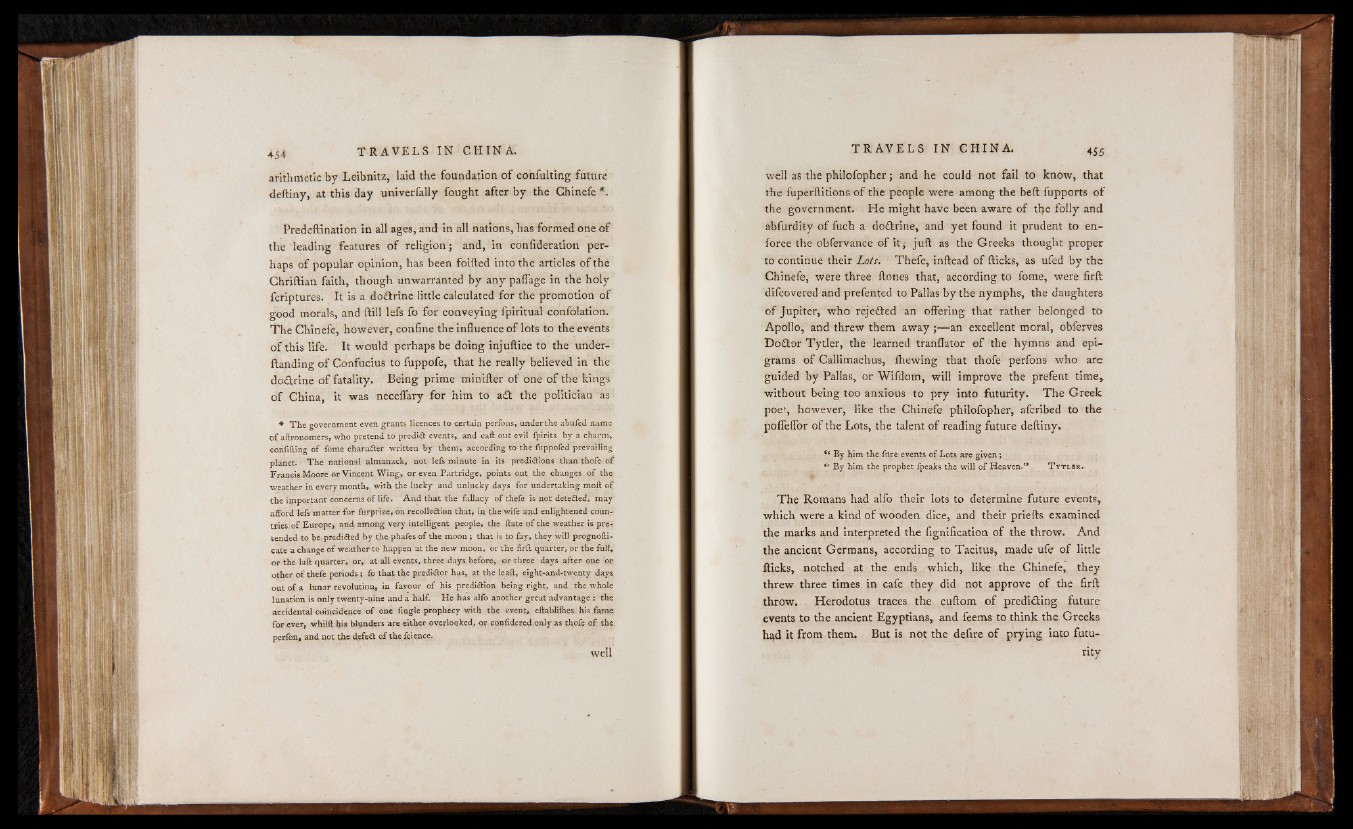
arithmetic by Leibnitz, laid the foundation o f confulting future
deftiny, at this day univerfally fought after by the Chinefe *.
Predeftination in all ages, and in all nations, has formed one o f
the leading features o f religion; and, in confideration perhaps
o f popular opinion, has been foifted into the articles o f the
Chriftian faith, though unwarranted by any paflage in the holy
fcriptures. It is a do£trine little calculated for the promotion of
good morals, and ftill lefs fo for conveying fpiritual confolation.
The Chinefe, however, confine the influence o f lots to the events
o f this life. It would perhaps be doing injuftice to the under-
ftanding o f Confucius to fuppofe, that he really believed in the
doTrine o f fatality. Being prime minifter o f one o f the kings
o f China, it was neceflary for him to a£t the politician as
* T h e government even grants licences to certain perfons, under the abufed name
o f aftronomers, who pretend to predi# events, and call out evil fpirits by a charm,
confiding o f fome chara&er written by them, according to the fuppofed prevailing
planet. T h e national almanack, not lefs minute in its predi&ions than thofe o f
F r a n c i s Moore or Vincent W in g , or even Partridge, points out the changes o f the
weather in every month, with the lucky and unlucky days for undertaking moil o f
the important concerns o f life. A n d that the fallacy o f thefe is not detedled, m a y
afford lefs matter for furprize, on recolle&ion that, in the wife and enlightened countries,
o f Europe, and among very intelligent people, the (late o f the weather is pretended
to be predicted by the phafes o f the moon ; that is to fay, they will prognofti-
cate a change o f weather to happen at the new moon, or the firft quarter, or the full,
or the laft quarter, or, at all events, three days before, or three days after one or
other o f thefe periods; fo that the predictor has , at the lead, eight-and-twenty days
out o f a lunar revolution, in fayour o f his prediction being right, and the whole
lunation is only twenty-nine and a half. He has alfo another great ad van ta g e : the
accidental coincidence o f one fingle prophecy with the event, eftabliihes his fame
for ever, whild h is blunders are either overlooked, or confxdered only as thofe o f the
perfon, and not the defeCt o f the fqience.
well
well as the philofopher; and he could not fail to know, that
the fuperilitipns o f the people were among the belt fupports o f
the government. He might have been aware o f tl)e folly and
abfurdity of fuch a doitrine, and yet found it prudent to enforce
the obfervance o f i t ; juft as the Greeks thought proper
to continue their Lots. Thefe, inftead o f flicks, as ufed by the
Chinefe, were three ftones that, according to fome, were firft
difcovered and prefented to Pallas by the nymphs, the daughters
o f Jupiter, who reje£ted an offering that rather belonged to
Apollo, and threw them away ;— an excellent moral, obferves
Doitor Tytler, the learned tranflator o f the hymns and epigrams
o f Callimachus, fhewing that thofe perfons who are
guided by Pallas, or Wifdom, will improve the prefent time,
without being too anxious to pry into futurity. The Greek
poet, however, like the Chinefe philofopher, afcribed to the
pofleflbr o f the Lots, the talent o f reading future deftiny.
“ B y him the fitre events o f Lots are g iv en ;
u B y him the prophet fpeaks the will o f Heaven.’ * T y t l b r . iPUr
The Romans had alfo their lots to determine future events,
which were a kind o f wooden dice, and their priefts examined
the marks and interpreted the fignification o f the throw. And
the ancient Germans, according to Tacitus, made ufe o f little
flicks, notched at the ends which, like the Chinefe, they
threw three times in cafe they did not approve o f the firft
throw. Herodotus traces the cuftom o f prediiling future
events to the ancient Egyptians, and feems to think the Greeks
had it from them. But is not the deftre o f prying into futurity